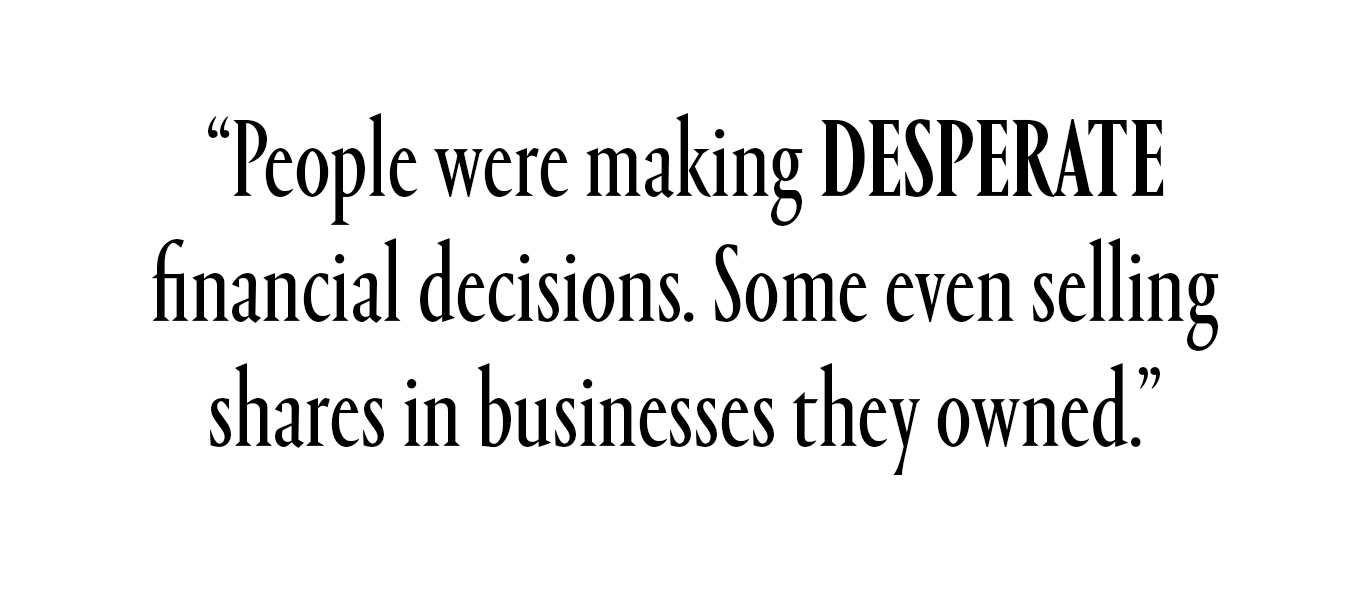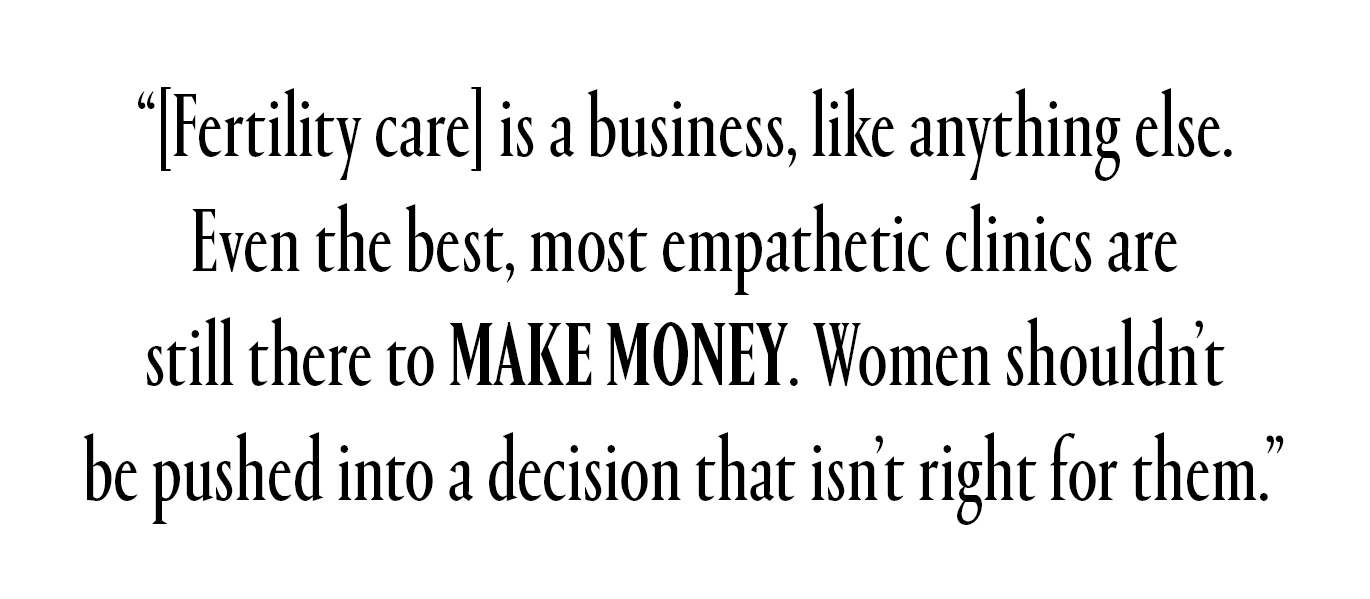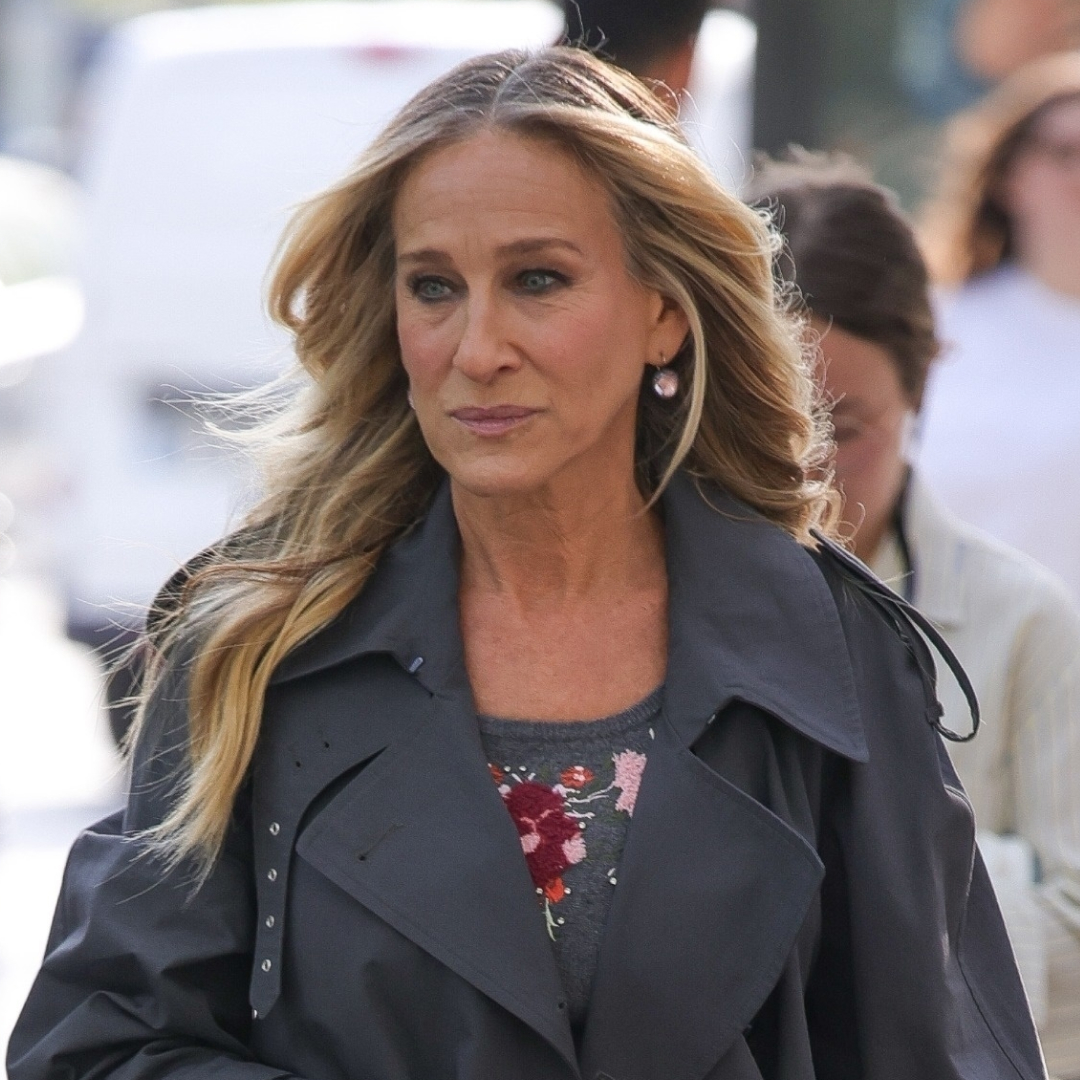The Big Business of Egg Freezing
The procedure is positioned as an investment for women and their futures. But it’s also expensive—putting those who do it into serious debt, as they’re forced to finance their fertility.


It’s probably come up in your group chat. Someone talking about freezing their eggs, debating whether they should do it, or if they have, detailing down to the prick of that first needle what the procedure was like. Maybe that someone is you.
No doubt, that’s not the only place you’ve heard about it. The Kardashians—Khloé and Kourtney to be specific—have spoken out about freezing their eggs. So have Paris Hilton, Chrissy Teigen, Rita Ora, a Real Housewife or two, and quite a few athletes, including players in the WNBA.
Then there are the numbers. According to the Society of Assisted Reproductive Technology, there was a 400 percent increase in the number of people freezing their eggs between 2012 and 2020 in the U.S. While egg freezing was once seen “as a last-ditch effort to preserve fertility,” says Lauren Makler, cofounder of Cofertility, a tech platform that helps people through their egg freezing journey, “now we see it as something for someone who wants to be empowered to live life on their own terms.”
Mostly, that’s a good thing. Much like birth control did for women in the ‘70s, egg freezing is poised to do the same: give women more agency over their bodies; allow them to call the shots on if—and when—they want to start a family. And the messaging around egg freezing is often just that: a positioning of the procedure as an investment in one’s future.
But is that totally true? Because while giving women more control over their reproductive choices is a good thing (and damn, we could certainly use more of that), it belies the reality that egg freezing is expensive. The cost for a woman to freeze her eggs is as much as $20,000 (that doesn’t include the “invisible” fees, keep reading—we get to that). And unlike birth control, which is often free or low-cost under health insurance plans, egg freezing is seen as an “elective” procedure, meaning it’s rarely covered by insurance. Meanwhile, healthcare providers recommend women freeze their eggs before they turn 35, often when they can afford it the least, and when they’re most likely to be single, meaning the cost isn’t shared with a partner.
To freeze their eggs, many women are finding themselves in precarious financial positions. According to a survey conducted by Market Cube, 70 percent of respondents incurred debt from fertility treatments. Angela Rastegar, a former director at Circle Surrogacy, part of one of the largest fertility and surrogacy companies, saw it all: One woman sold her engagement ring. Countless others liquidated their 401(k)s. Twentysomethings signed up for big loans before they’d even purchased a car or a home. “People were making desperate financial decisions,” she says. “Some even selling shares in businesses they owned.”

The affordability gap has given rise to a cottage industry of fertility financing. Many egg freezing clinics send women without the ability to pay to banks, where their only option is to take out a personal loan. “This route will likely be the most expensive financing option, as they are unsecured loans and usually come with high interest rates that can be in the double digits,” says Cameron Rogers, a financial advisor at Ellevest, an investment and wealth management platform for women. Double digits can mean as high as 36 percent. Other clinics offer in-house financing options with partnering lenders and financial institutions that specialize in fertility financing available on the spot.
Stay In The Know
Get exclusive access to fashion and beauty trends, hot-off-the-press celebrity news, and more.
The risks of large interest rates and long repayment periods are compounded by the fact that many women report they aren’t given the full picture of what egg freezing actually costs—and that even after taking out a loan, it’s not enough. That’s because of “invisible” fees, like: the yearly cost to store eggs, which averages about $700 annually (a study in Science Direct shows that the majority of women keep their eggs in storage for more than five years). And according to a report in the Washington Post, fertility clinics continue to hike up their storage fees as demand for space increases. Then, if you ever want to use your eggs, you’ll need to go through IVF, which is between $15,000 and $30,000 for each round (multiple rounds are frequently needed).

Recognizing the need for better financial support, there are clinics that are trying to help. Kindbody, a family-building clinic with locations across the country, employs a team of “financial navigators” tasked with ensuring “that patients are well educated about the financial and insurance aspects of their care,” according to a job posting.
Some fertility financing companies are adding transparency to the process, too. Future Family pre-negotiates with clinics and doctors to make sure there are no surprise costs when it comes to clinic visits, lab work, or medications. Their plans run for about 60 months, and range between $300 and $475 a month.

It’s impossible to overlook the emotion laced throughout all of this, though, especially when egg freezing doesn’t seem optional for everyone, including those undergoing the procedure for medical reasons or for same sex couples who rely on it for family planning.
“It can be an incredibly isolating and emotional process that many women feel shame about,” says Whitney Santos of Tucson, Arizona, who went through the egg freezing process. To do so, she went beyond her limits, physically, emotionally, and financially. “I used the totality of my 401(k) in part for IVF medications and the monthly egg freezing fee,” she says, which equated to about $20,000.
Santos adds: “[Fertility care] is a business, like anything else. Even the best, most empathetic clinics are still there to make money. Women shouldn’t be pushed into a decision that isn’t right for them.”
Rastegar knew there needed to be a breakthrough. And so, in 2022, she launched Sunfish, a company focused on making family building more financially attainable for those facing fertility challenges, including by connecting customers to discounts and grants.
For those who still need to take out loans, Sunfish designed The Gold IVF Success Program to create radical transparency around the costs. It uses an algorithm to adjust to your unique bio data. The company will guarantee the cost is accurate or up to 90 percent of your money back. “It’s crazy that we could buy insurance online for a Peloton, a car or vacation, but there’s no financial protection for going through the process of egg freezing and IVF,” says Rastegar.
There are other disruptors. Cofertility has brought together egg freezing and egg donation at scale for the first time by creating two digital platforms that allow qualifying women to retrieve, freeze, and store half their eggs for free when they donate half of their eggs to a family who can't otherwise conceive.

Employers are stepping in, too, with companies like Disney, Apple, and Spotify offering health insurance plans that cover fertility treatments, including egg freezing.
But even that has its problems. “Employer benefits are rarely robust, and not enough to get to the finish line,” says Makler. It also opens the door for employers to have access to intimate details about health issues and family planning decisions.
At Amazon, family-planning benefits, including egg freezing, kick in on the first day of employment. So far, about 30,000 people have leveraged these benefits, according to the company. But there’s been backlash after The Cut reported that women were working graveyard shifts and strenuous jobs just to pay for fertility preservation.
To get to the kind of systemic shape-shifting that’s needed for real change, will require something even bigger. Starting with state mandates that require insurance companies to cover fertility care. Says Rastagar, “Fertility treatments should not just be for the one percent.”


Tanya Benedicto Klich is Senior Editor at Marie Claire where she manages the Money & Career section. Over the course of her 10+ years as a journalist she has overseen the coverage of female founders, funders, executives, innovators and more. Tanya was previously a Lifestyle Reporter for Forbes, where she worked at the ForbesWomen and Forbes Lifestyle verticals. She was also a Features Editor at Entrepreneur Magazine, and a former on-air reporter for NY1 News. Tanya is also a graduate of Columbia University Graduate School of Journalism where she specialized in business & economic journalism, and is an adjunct professor at the NYU Arthur L. Carter Journalism Institute. She lives in Brooklyn with her husband and two little sons. Follow her on Twitter: @TanyaKlich
-
 Kate and William's Decision to Skip Easter "Raised Eyebrows"
Kate and William's Decision to Skip Easter "Raised Eyebrows""It feels like a deliberate move and even a snub."
By Amy Mackelden
-
 Sarah Jessica Parker Test-Drives the New Platform Ugg
Sarah Jessica Parker Test-Drives the New Platform UggCarrie Bradshaw would have some thoughts on the exceedingly fluffy footwear.
By Amy Mackelden
-
 Michelle Obama Elevates Baggy Cargo Pants With a $3,700 Tote
Michelle Obama Elevates Baggy Cargo Pants With a $3,700 ToteThe former First Lady elevated her casual outfit with sleek accessories.
By Amy Mackelden